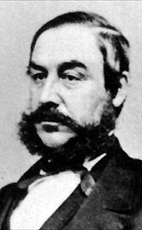The New Brunswick general election of 1866 was held in May and June 1866 to elect 41 members to the 21st New Brunswick Legislative Assembly. This was the 21st general election for the British colony of New Brunswick, but is considered the 1st general election for the Canadian province of New Brunswick as New Brunswick joined Canadian Confederation on July 1, 1867, during the life of the Legislative Assembly.

New Brunswick is one of four Atlantic provinces on the east coast of Canada. According to the Constitution of Canada, New Brunswick is the only bilingual province. About two thirds of the population declare themselves anglophones and a third francophones. One third of the population describes themselves as bilingual. Atypically for Canada, only about half of the population lives in urban areas, mostly in Greater Moncton, Greater Saint John and the capital Fredericton.

Canada is a country in the northern part of North America. Its ten provinces and three territories extend from the Atlantic to the Pacific and northward into the Arctic Ocean, covering 9.98 million square kilometres, making it the world's second-largest country by total area. Canada's southern border with the United States, stretching some 8,891 kilometres (5,525 mi), is the world's longest bi-national land border. Its capital is Ottawa, and its three largest metropolitan areas are Toronto, Montreal, and Vancouver. As a whole, Canada is sparsely populated, the majority of its land area being dominated by forest and tundra. Consequently, its population is highly urbanized, with over 80 percent of its inhabitants concentrated in large and medium-sized cities, with 70% of citizens residing within 100 kilometres (62 mi) of the southern border. Canada's climate varies widely across its vast area, ranging from arctic weather in the north, to hot summers in the southern regions, with four distinct seasons.

The provinces and territories of Canada are sub-national governments within the geographical areas of Canada under the authority of the Canadian Constitution. In the 1867 Canadian Confederation, three provinces of British North America—New Brunswick, Nova Scotia, and the Province of Canada —were united to form a federated colony, becoming a sovereign nation in the next century. Over its history, Canada's international borders have changed several times, and the country has grown from the original four provinces to the current ten provinces and three territories. Together, the provinces and territories make up the world's second-largest country by area.
Of forty-one MLAs, thirty-three were confederationalists, supporting confederation, and eight were constitutionalists, opposed to confederation, who formed the opposition.
A Member of the Legislative Assembly (MLA), or a Member of the Legislature (ML), is a representative elected by the voters of a constituency to the legislature or legislative assembly of a sub-national jurisdiction.
Confederation Party was a term for the parties supporting Canadian confederation in the British colonies of New Brunswick, Nova Scotia and Newfoundland in the 1860s when politics became polarised between supporters and opponents of Confederation. The Confederation parties were accordingly opposed by Anti-Confederation parties in those three jurisdictions. A conference was held on September 1, 1864, in Charlottetown when the Province of Canada became interested in it. Sir John A. Macdonald was a huge promoter of Confederation and even made an alliance with his political rival, George Brown to make it happen.

Canadian Confederation was the process by which the British colonies of Canada, Nova Scotia, and New Brunswick were united into one Dominion of Canada on July 1, 1867. Upon confederation, the old province of Canada was divided into Ontario and Quebec; along with Nova Scotia and New Brunswick, the new federation thus comprised four provinces. Over the years since Confederation, Canada has seen numerous territorial changes and expansions, resulting in the current union of ten provinces and three territories.
| New Brunswick general election, 1866 | ||
|---|---|---|
| Party | Leader | Seats |
| Government (confederationalists) | Peter Mitchell | 41 |
| Opposition (constitutionalists) | Albert James Smith | 8 |








